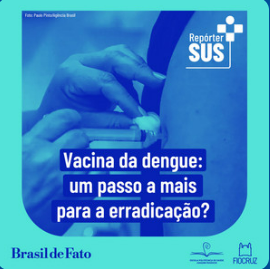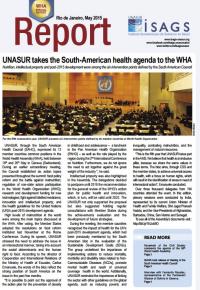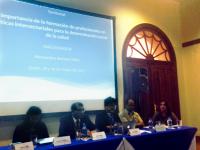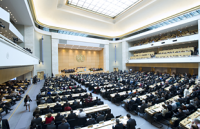In Brazil dengue vaccine makes progress, but controlling the spread of mosquitoes remains essential.

The announcement that Brazil will have a nationally produced dengue vaccine available starting next year represents a significant advancement in the fight against the spread of the disease. With large-scale production, the country is taking a major step toward expanding protection for its population. However, the vaccine alone does not mean the end of the arbovirus.
In an interview with the podcast Repórter SUS, Renato Kfouri, vice-president of the Brazilian Society of Immunizations (SBIm), stated that few nations on the planet have the "privilege" of access to the vaccine doses and that vaccination places Brazil in a unique position. Nevertheless, the expert emphasizes that immunization does not have the potential to eradicate dengue. According to Kfouri, controlling the disease necessarily requires a multifactorial approach.
"Dengue is a disease with a vector that is difficult to control in a country like ours, where the opportunities for mosquito proliferation are enormous due to climatic, sociodemographic, economic, and sanitary factors. Sewage, landfills, construction sites—our urban landscape greatly favors mosquito proliferation. So, I view the possibility of having vaccines with great hope, but as an additional tool. We will still have to control the mosquito, but by combining this with vaccination strategies, we can minimize the significant and painful impact dengue has had on our population."
According to the Ministry of Health, there will be 60 million doses per year, with the vaccination campaign starting in 2026. The target population for the first phase of production will be individuals aged 2 to 59 years. The federal government announced an investment of R$ 68 million for the production of the initial doses.
This amount is part of a total investment of R$ 1.26 billion in a partnership between the Butantan Institute and the international company WuXi Biologics, through the Ministry of Health's Local Development and Innovation Program (PDIL), with support from the new Growth Acceleration Program (PAC). Brazil is the first country in the world to offer the vaccine free of charge as a public policy.
This is not the first time the Unified Health System (SUS) has made a dengue vaccine available for free. Since January 2024, the Japanese vaccine Qdenga has been offered through SUS, but the number of doses produced by the manufacturer is low. This led the Ministry of Health to establish more restricted and specific target groups. Initially, the campaign focused on children and adolescents aged 10 to 14 in cities with more critical scenarios.
Even so, demand was low among the portion of the population eligible for vaccination and in the municipalities selected to receive the vaccine. Earlier this year, the Brazilian Society of Immunizations issued an alert regarding insufficient adherence. Only half of the doses distributed by the Ministry of Health had been administered.
Renato Kfouri states that there are several factors contributing to this scenario, and the limited number of doses is among them. However, he emphasizes the need for actions such as expanding vaccination sites and informing the public about the availability of doses.
"We had to start with adolescents, and vaccinating adolescents is not an easy task. We also faced another major problem: since not all municipalities were included, we didn’t have a national campaign to call everyone to action. It was up to each municipality to inform its population. We also had to be cautious about vaccine safety, which meant only administering vaccines in health units. Extramural vaccination, for example in schools, which would have been a great solution for vaccinating adolescents, was halted. Fortunately, we have now managed to reverse this situation somewhat, allowing for more flexibility for municipalities."
Despite the challenging scenario in 2024, which saw record numbers of over 6.6 million probable cases and 6,103 deaths from dengue, the most recent data from the Ministry of Health indicates a nearly 70% drop in the number of people infected with dengue in January and February 2025.
For Renato Kfouri, the key to effective and lasting dengue control lies in the continuity and comprehensiveness of public policies:
"There is no doubt that dengue is a disease on the rise globally. Despite the sanitary conditions and all the factors we’ve listed as major contributors to mosquito proliferation and, consequently, the disease, we must remember that climate change has led to cases occurring in unimaginable places. In other words, there is potential for expansion. Today, half of the world’s population lives in countries at risk for dengue. Therefore, control strategies must be continuous public policies. Arboviruses or vector-borne diseases like those transmitted by mosquitoes are a problem for today and tomorrow, both in Brazil and worldwide."
Repórter SUS is a partnership between Brasil de Fato and the Joaquim Venâncio Polytechnic School of Health, part of the Oswaldo Cruz Foundation (Fiocruz). New episodes are released every week.



